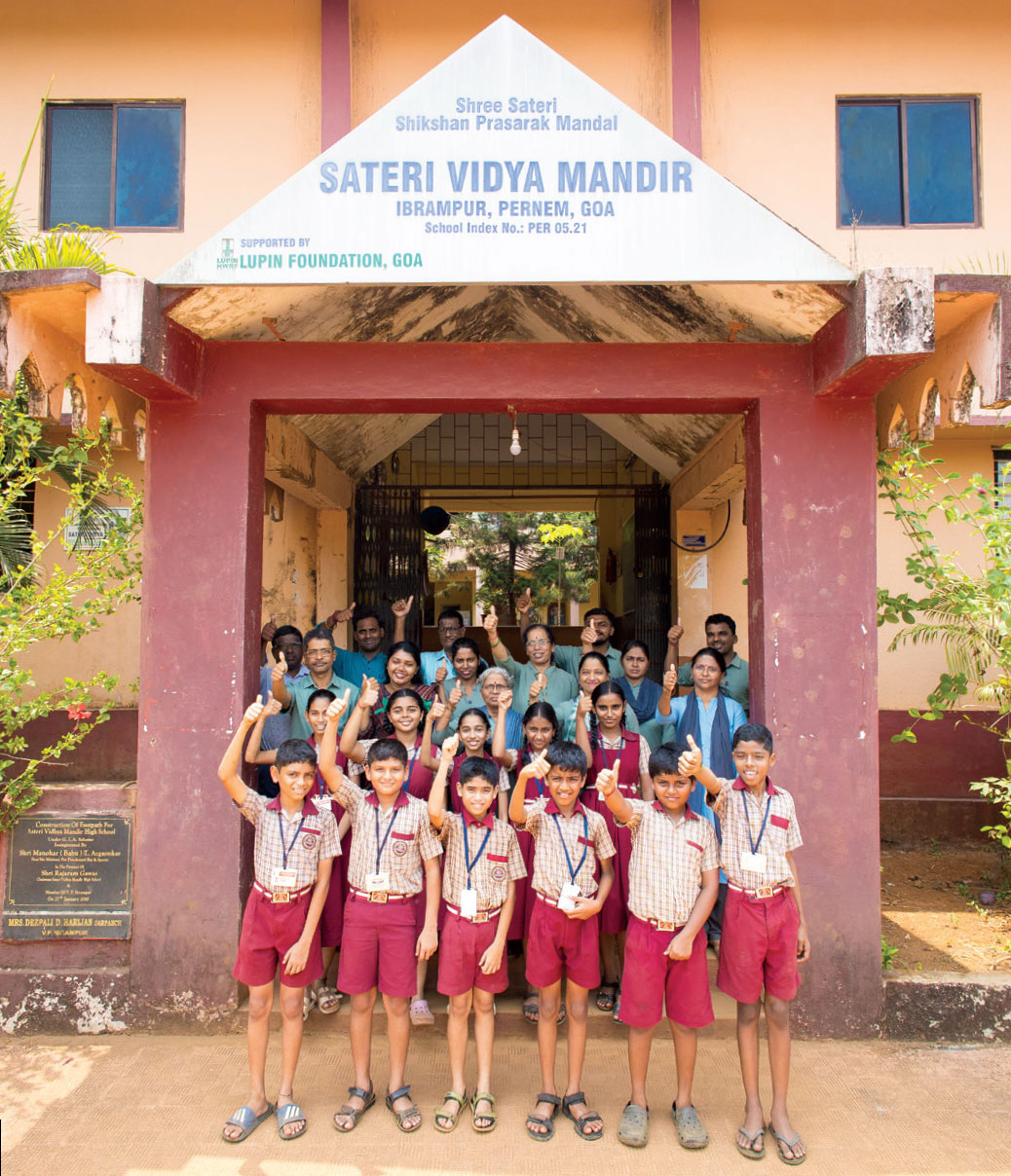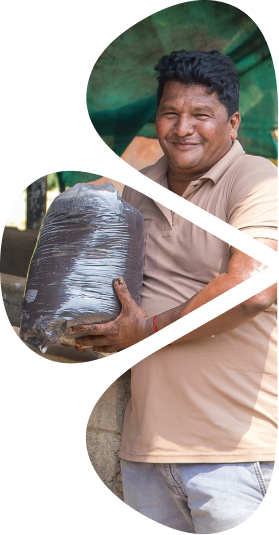Extending the reach of healing to communities and patients
At Lupin, our relationship with society goes beyond responsibility: it is a relationship of care, trust, and shared progress. As a global leader in healthcare, we hold a distinct privilege and position to make an impact on people’s lives. Across the geographies we serve, our mission remains constant: to enable access to quality, affordable healthcare for all. Our commitment is fueled by the trust we build with patients, and the empowerment we bring to communities.
Through the Lupin Foundation, we work across 5,400 villages and underserved regions in India, alongside governments, NGOs, and international organizations, to drive long-term enhancements across a spectrum of initiatives. These include healthcare, livelihoods, and Water, Sanitation, and Hygiene (WASH) intitiatives.
In the same vein, our Patient Support Programs (PSPs) are integral to our access strategy, focusing on addressing barriers, be it emotional, financial, or logistical, for those who are in need. From providing free diagnostics and counseling, to catalyzing therapy adherence and follow-ups for chronic conditions like diabetes and COPD, our PSPs reflect our belief that healing must be holistic. We also continue to invest in building strong, trusted relationships with healthcare professionals (HCPs). Through continuous medical education, digital engagement, real-world evidence programs, and knowledge-sharing platforms, we support doctors in delivering optimal care. Our approach is not transactional, but transformational, rooted in shared values and a commitment to better outcomes.
Our supplier ecosystem is equally critical in this journey and our suppliers are strategic partners in delivering reliable, high-quality care. In FY25, we undertook a comprehensive revamp of our supply chain practices, embedding responsible sourcing, risk mitigation, and sustainability at every step.
As we look ahead, our commitment remains unwavering — to nurture meaningful relationships, empower communities, and uphold the trust that patients, doctors, partners, and society place in us every day. At Lupin, transforming hope into healing is the fabric of who we are and why we exist.

INR 247 Mn
CSR Investments
414,144
Beneficiaries
24,369
Employee Volunteering Hours
370+
Suppliers Assessed on ESG Performance
38,974
Healthcare Professionals Trained
1,491,740
People Reached through Patient Assistance Programs
Material Topics
and Safety
Supply Chain
and Affordability
and Product Labeling
CSR Strategy
At Lupin, we believe that true healthcare goes beyond treating illness — it involves addressing the broader social determinants that impact health and well-being. Our flagship Livelihood and Lives programs are designed to do exactly that. They combine economic empowerment with healthcare access, creating a holistic and sustainable development model that uplifts.
Livelihood Program
The Livelihood program (Desh Bandhu Jan Utkarsha Pariyojana) has been the fulcrum of our community initiatives for over three decades. Built on the principles of self-reliance and inclusive growth, it focuses on enabling individuals and families to break the cycle of poverty. Our efforts are focused on enhancing farmers’ income through improved access to markets, efficient water use, and better natural resource management. By promoting sustainable agriculture and strengthening farming systems, we aim to create long-term impact and build resilience within rural communities.
Target 2030: Empower 2.5 Mn individuals in over 5,000 villages, through the Livelihood program.
In FY25: 248,256 individuals empowered across 1,191 villages.
Lives Program
Our Lives program (Desh Bandhu Jan Aarogya Seva) is focused on improving the quality of life in underserved regions by strengthening local health systems. This includes deploying trained health workers, organizing health camps, and working closely with state authorities to ensure last-mile access to critical services. A special focus has been placed on addressing Chronic Obstructive Pulmonary Disease (COPD) and Cardiovascular Disease (CVD) — two growing concerns in rural India. By offering early detection, awareness, and linkage to care, we are creating healthier communities that are better equipped to thrive.
Target 2030: Screen 500,000 individuals in 3,000 villages through the Lives program.
In FY25: 165,888 individuals screened across 673 villages.
Livelihood Program: Empowering Prosperity, One Person at a Time
In the rural heartlands of India, where opportunity often feels distant, Lupin’s Livelihood Program has long served as a catalyst for transformation. Rooted in the spirit of empowerment, the program has consistently brought sustainable, locally relevant solutions to some of India’s most economically vulnerable communities. This year, while the mission remained the same, the approach evolved — becoming sharper, bolder, and more focused branded under the Desh Bandhu Jan Utkarsh Pariyojana. In FY25, we introduced the Agriculture-Based Livelihood Empowerment (ABLE) initiative, a strategic pivot that reorients our efforts towards supporting 20,000 small and marginal farmers across Maharashtra and Rajasthan. At the heart of ABLE is a deep commitment to climate resilience and technology-led agriculture, helping farmers not only adapt to shifting environmental realities but also thrive through higher productivity and income diversification. We aspire to deliver a compounded 25% increase in annual incomes for our farmers over the next three years. It is an ambitious goal, one that we are proud to carry.
“The water pipeline connectivity has been a crucial intervention that has simplified the water collection process for all of us in Chilare. The intervention helped increase my agricultural yield through improved irrigational facilities. I have supplemented my annual household income through livestock and poultry.”
Mridan (beneficiary) Chilare Village, Shirpur Block, DhuleKey Highlights for FY25
Training and Knowledge Building: Over 14,000 farmers were trained in pre-season and mid-season best practices for Rabi crops.
Demonstration Plots: 180 crop demonstrations were conducted across onion, tomato, maize, and brinjal to promote optimal cultivation techniques.
Animal Husbandry Support: In collaboration with BAIF, four Artificial Insemination (AI) centers were established in Dhule and Alwar, alongside 39 animal health camps, benefiting nearly 12,000 livestock.
Water Management: More than 760 farmers adopted micro-irrigation systems (drip and sprinkler), enhancing water efficiency. Additionally, 20 sites for water harvesting structures were identified, with construction underway.
Institutional Engagement: District Advisory Committees were constituted in Alwar and Dhule, involving key district-level government officials for program oversight and alignment.
Access to Government Schemes: 3,700 farmers accessed welfare schemes through our facilitation efforts, unlocking direct benefits worth INR 20 Mn.
Together, these initiatives are building more than just economic resilience — they are nurturing confidence, dignity, and a pathway to long-term prosperity for thousands of rural families.
Our Commitment to Water Stewardship
Water is a vital natural resource that underpins the prosperity and growth of rural areas.
At the Lupin Human Welfare & Research Foundation, we recognize that sustainable water management is critical to secure the future of our communities, especially for small and marginal farmers who depend on the land for their livelihoods. Hence, our approach to water stewardship goes beyond conservation — it’s about regeneration. Through integrated watershed development projects in underserved regions, we are improving water availability, revitalizing soil health, and building long-term climate resilience for those most vulnerable to environmental shocks.
Our interventions are designed to work in harmony with nature. We have implemented a wide range of soil and water conservation structures — from Continuous Contour Trenches (CCTs) and water absorption trenches to gully plugs, earthen bunds, check dams, farm ponds, and wells. Each of these serves to reduce soil erosion, recharge groundwater, and boost the water-holding capacity of local landscapes.
But it’s not just about saving water — it’s about using it wisely. To that end, we are actively encouraging the adoption of micro-irrigation systems such as drip lines, sprinklers, and rain guns, along with efficient water-lifting technologies. These solutions ensure that every drop counts, improving farm productivity while reducing environmental stress.
Our water stewardship efforts represent a commitment not only to the land and those who cultivate it but also to a future where communities are empowered, ecosystems are resilient, and growth is sustainable.
Measuring Our Impact
129,653 Cu.M
Water Storage Capacity Developed
337
Water Harvesting Structures Constructed
290
Water Lifting Devices Provided
Lives Program: Enabling Broader Patient Impact
In the remote corners of rural India, where healthcare remains out of reach for many, Lupin’s Lives Program is transforming the way care is accessed and delivered. For countless communities in Rajasthan’s Alwar district and Maharashtra’s Palghar district, our program branded under Desh Bandhu Jan Aarogya Seva brings hope on wheels, bridging the last mile in healthcare with compassion and consistency.
This year, we deepened our commitment to health equity by expanding our mobile medical fleet from two to five vans. These fully equipped units now make regular visits to Primary Health Centers (PHCs) and Community Health Centers (CHCs) every 15 days. For areas like Palghar, where the nearest healthcare facility can be over 12 kilometers away, these vans serve as lifelines, ensuring that no one is denied the care they deserve.
Our mobile units deliver a full spectrum of services: doctor consultations, free medicines, advanced diagnostics, and lifestyle counseling. Their operations now extend to over 690 villages, facilitating early detection of illnesses, preventing complications, and guiding people toward healthier lifestyles. This year, we initiated community-based screenings for non-communicable diseases (NCDs) in individuals over the age of 30 to address the increasing prevalence of chronic illnesses in underserved regions.
Key Highlights for FY25
Health Camps: Conducted 690+ health camps, benefiting over 1.65 lakh individuals across Maharashtra and Rajasthan. Facilitated 53,347 patient consultations through 901 camps, extending real care to those who need it most.
NCD Awareness Drives: Launched 500+ street plays and 1,000+ wall paintings as part of NCD awareness drives, using community-led communication to inspire behavioral change.
Public Healthcare: Strengthened public healthcare capacity by supporting 250 healthcare professionals with equipment, infrastructure, and training.
Awareness Drives: Disseminated multilingual Information, Education, and Communication (IEC) material to promote preventive care and healthier lifestyles.
Promoting Good Health: Continued operations of 18 open gyms, encouraging regular physical activity across rural areas.
“For years, I struggled with diabetes and hypertension, often facing severe chest pain and breathlessness, yet my condition remained undiagnosed. Living in a remote coastal area with limited healthcare access made regular treatment difficult. The health outreach program finally helped me receive timely interventions and care. A community mobilizer visited me, guided me to a health camp, and ensured that I received advanced diagnostics and specialist care. I am truly blessed that this support has added many years to my life.”
Jitendra (beneficiary) Dahanu Block, PalgharBridging the Digital Divide
Lupin is helping individuals create Ayushman Bharat Health Account (ABHA) IDs in underserved regions, aiming to enhance healthcare accessibility.
ABHA is a unique 14-digit ID that links a person’s health records to improve access and efficiency in healthcare delivery. It is a part of the Indian government’s digital health initiative. While ABHA holds significant promise in transforming healthcare delivery, adoption remains a challenge, particularly in rural areas, due to limited digital infrastructure and connectivity.
Strengthening TB Screening
We are assisting government health centers by providing essential equipment like Truenat, which enables efficient and accurate tuberculosis testing.
Aligning with the National Tuberculosis Program, Lupin is making significant efforts in enhancing tuberculosis screening. This initiative ensures communities receive timely diagnoses and appropriate care, bringing us one step closer to eradicating this disease. By combining our efforts, we can strengthen public health and make a tangible difference in the lives of those we serve.
WASH Program – Restoring Health, Hygiene, and Dignity
In communities where clean water and safe sanitation remain distant aspirations, Lupin’s WASH Program helps in restoring dignity, enabling education, and empowering women. By focusing on Water, Sanitation, and Hygiene (WASH), we are enabling and reshaping environments where health can flourish.
Launched this year across five key locations — Visakhapatnam, Tarapur, Ankleshwar, CSN, and Mandideep, the program delivers need-based, localized interventions, particularly in schools and healthcare centers.
Schools that are equipped with WASH provide children, especially girls, with a protected and clean environment, conducive to learning. Providing access to clean water and upgraded sanitation facilities significantly enhances school attendance, retention, and learning conditions. Similarly, we are upgrading sanitation infrastructure in public healthcare to serve the needs of women. This year, we improved the women’s restroom facilities at nine government healthcare centers in Alwar and Palghar, thereby supporting safer and more dignified care experiences for both patients and staff. For Lupin, sanitation is not merely an ancillary initiative but a fundamental aspect of promoting health equity. The WASH Program embodies our conviction that genuine healthcare starts with dignity, and dignity starts with meeting basic needs.
Impact Assessment – Measuring What Truly Matters
At Lupin, a program’s intent is only as powerful as its impact and hence, every initiative we launch is rigorously assessed. A comprehensive evaluation is essential to ensure that our initiatives are yielding tangible, quantifiable, and significant benefits for the communities we serve.
We collaborate with independent experts and agencies to evaluate our programs based on inclusiveness, relevance to community needs, alignment with expectations, integration with other efforts, and service delivery quality. We also assess the Social Return on Investment (SROI) to comprehend the broader value generated for every rupee spent.
Our assessments are practical and firmly grounded in real-world conditions. Each quarter, teams conduct site visits, engage with farmers, monitor attendance, and analyze data, such as pre- and post-harvest incomes, to verify that progress is substantiated rather than merely asserted.
A recent impact assessment of our water resource development initiative near the Jamkheli River showed encouraging results. We observed a notable expansion in Rabi cultivation, increased watershed coverage, reinforced check dam infrastructure, and agricultural production zones witnessed a two-fold increase. These outcomes validate our approach and inspire us to progress further.
At Lupin, we recognize that sustainable impact cannot be achieved in isolation. Therefore, through strategic partnerships, we enhance our influence and extend our reach. We work in collaboration with national institutions, grassroots NGOs, and corporate partners, to multiply our reach and amplify our impact.
Each partnership is forged with intent, to co-create solutions that are sustainable, scalable, and rooted in community needs. Our partners assist in enhancing farmer resilience, increasing access to healthcare, and developing water-secure villages, thereby facilitating the transition from intent to action, and from action to transformation. Together, we are redefining what is achievable for communities that have long been marginalized, ensuring inclusivity and progress for all.
Private and Institutional Partnerships
- Better Cotton
- GIZ (Deutsche Gesellschaft für InternationaleZusammenarbeit)
- Small Farmer Agribusiness Consortium
- Indian Council of Agricultural Research
- National Bank for Agriculture and Rural Development
- Atlas Copco (India) Pvt. Ltd.
- Whirlpool Corporation
- BAIF Development Research Foundation (formerly registered as the Bharatiya Agro Industries Foundation)
Partnerships with State Governments
- Government of Maharashtra
- Government of Rajasthan
Empowering Futures in South Africa
Pharma Dynamics, our South African subsidiary, consistently exemplifies the effectiveness of local partnerships in achieving sustainable community impact. In FY25, we invested over ZAR 5 Mn (INR 23.20 Mn) in developing local healthcare talent. Our flagship Youth Employment Service (YES) Program offers participants a year of paid work experience, mentorship, and training in critical digital skills. This year, 88 unemployed individuals — 69% of them women — participated in the program. Together, they completed more than 30,000 minutes of learning focused on Fourth Industrial Revolution (4IR) skills. Notably, 86.5% of participants rated their experience as ‘positive,’ reflecting the program’s effectiveness in enhancing employability.
Since 2020, Pharma Dynamics has also invested over ZAR 8 Mn (INR 37.80 Mn) in the Desmond Tutu Desk Campaign, a remarkable initiative led by the Desmond Tutu Legacy Foundation to expand access to education. Through this partnership, we have helped deliver essential learning tools to under-resourced schools, enabling children to pursue education in more conducive environments. The campaign aims to reach 20 Mn children by the end of 2025.
Through initiatives such as YES and the Desmond Tutu Desk Campaign, Lupin is committed to investing in education and employment while contributing to a more inclusive and resilient future for South African communities.
Before and After Image of a Water Conservation Structure in Madari Nala, Dhule District, Maharashtra
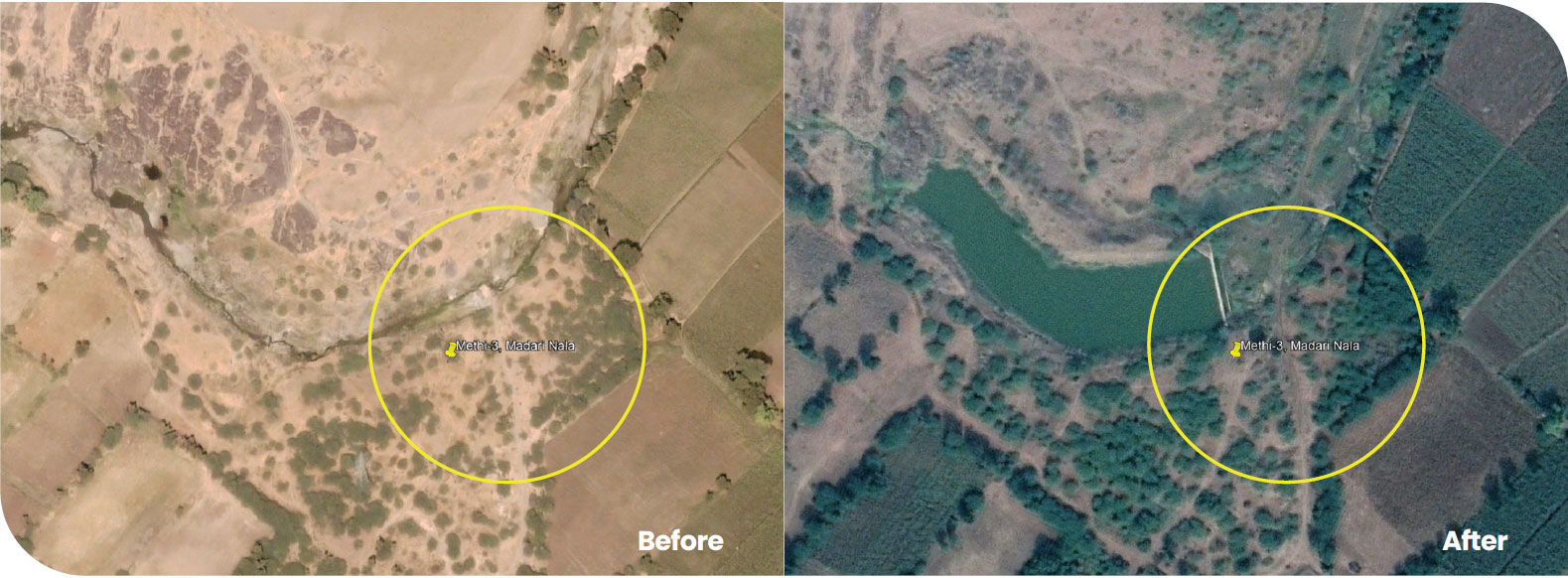
Employee Volunteering
For Lupinytts, volunteering transcends mere goodwill; it is a meaningful demonstration of our purpose in practice. Employees are encouraged and supported to volunteer their time, skills, and abilities to contribute to projects that create tangible community impact. Each year, we run a variety of structured employee volunteering programs in partnership with the Lupin Foundation and local NGOs, reinforcing our commitment to responsible citizenship. Our long-term aspiration is to collectively contribute 50,000 volunteering hours by 2030 — a target we are well on our way to achieving. In FY25, 4,788 Lupinytts together contributed 24,369 volunteering hours signifying empathy, care, and collective impact.
Core Thematic Areas
We have identified three core themes for our employee volunteering initiatives: Tree Plantation, Water Conservation, and Blood Donation. These themes are reflective of our commitment to nature and human welfare. Our tree plantation drives for instance, resulted in the planting of 7,255 saplings. Activities like seed ball preparation made the experience more engaging while furthering reforestation goals.
Our employees demonstrated commendable commitment to cleanliness campaigns, by participating in beach and park cleanups, thereby contributing to healthier and more welcoming public spaces for everyone.
Given our roots in healthcare, community health is a natural extension of our purpose. Employees actively supported free health check-up camps in rural areas and blood donation drives in collaboration with local blood banks. Volunteers contributed to early childhood education in disadvantaged areas by teaching in charitable schools and creating preschool kits.
Enabling Impact Through Strong Governance
To scale our volunteering efforts meaningfully, we have established a robust governance framework. A central volunteering steering panel oversees calendarized plans and ensures effective execution globally. The panel regularly monitors critical indicators including the number of employee volunteers, hours dedicated, and trees planted. It also collaborates closely with local leadership to identify relevant opportunities and allocate resources efficiently. At Lupin, volunteering is integral to our mission and values. It embodies how we fulfil our purpose beyond the workplace. Collectively, we measure our impact not by hours spent, but by the lives we positively affect.
Volunteering Highlights from Our Global Locations
U.K.
U.S.
Australia
South Africa
Mexico
Netherlands
Philippines
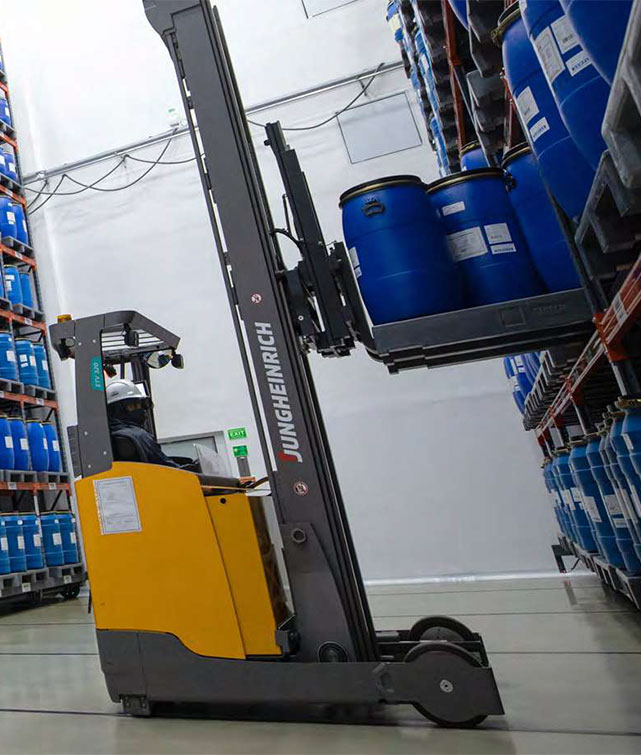
Our Approach Toward Access to Medicine and Affordability
Our approach to access and affordability is rooted in our purpose of catalyzing treatments that transform hope into healing. Every patient carries the hope of healing, and we exist to make that healing both affordable and accessible. We are committed to expanding access to essential medicines, for vulnerable populations in low- and middle-income countries. Our mission is to deliver safe, effective, and high-quality medicines and health solutions that improve global health outcomes. To that end, we have pioneered access-oriented models across both regulated and non-regulated markets. Our efforts are especially focused on combating tuberculosis, cardiovascular diseases, and diabetes through medication, diagnostics, and holistic care solutions. We are also investing in digital transformation to bridge gaps in healthcare accessibility. Our platforms connect patients with healthcare professionals for cardiovascular and diabetes care, enabling faster interventions, streamlining patient journeys, and prioritizing well-being.
We are firmly committed to refraining from patenting or enforcing intellectual property rights on diseases covered by ATMI-2021 in Least Developed Countries (LDC), Low Income Countries (LIC), and Lower-Middle-Income Countries (LMIC). This policy ensures that medications remain affordable and accessible for those who need them.
| Contributions Toward Improving the Patient’s Full Cycle of Care | |||
|---|---|---|---|
Prevention |
Diagnosis |
Treatment |
End-to-End Cycle Solutions |
|
Our flagship patient support programs such as HuMrahi, Joint Airways Initiative (JAI), and SAARTHI are designed to raise awareness, improve treatment adherence, and empower patients across key health areas. By FY30, we aim to support 300,000 patients through these initiatives. |
We are committed to improving early diagnosis through targeted screening initiatives. Our goal is to assist in the diagnosis of lung diseases for over 2 Mn patients through FeNO and spirometry tests. Additionally, we are working to help diagnose breast cancer in 5,000 women by 2030. |
Lupin’s Atharv Ability is India’s first-of-its-kind outpatient neuro-rehabilitation center, offering specialized care for patients recovering from stroke, traumatic brain injury, spinal cord injury, and pediatric neurological conditions, as well as those living with Parkinson’s, cerebral palsy, and multiple sclerosis. Our objective is to expand the services of the neuro rehabilitation centre, and reach 100,000 sessions by the year 2030. |
Lyfe is India’s first and only evidence-based Digital Therapeutics solution for cardiac rehabilitation, designed to support post-acute coronary syndrome (ACS) care. By FY30, we aim to reach 100,000 patients through this program. Building on its success, last year we introduced Lyfe HF, an extension of the platform tailored for patients living with heart failure. Our exclusive collaboration with the American College of Cardiology strengthens the program’s clinical capabilities. Regulatory achievements, such as ISO 27001:2022 certification and approval from the Central Drugs Standard Control Organization for our platform as a Class C Software as a Medical Device, emphasize our adherence to high levels of quality care. |

Education Programs for Patients and Healthcare Professionals
| Patient Support Programs | |
|---|---|
|
For Diabetes and Cardiac |
HuMrahi simplifies diabetes management for patients by offering personalized diet and lifestyle counselling, free blood sugar diagnostic tests, and complimentary medicines to eligible patients, through an award-winning, zero-cost and multi-lingual app. With educational content delivered in 12 regional languages through 275+ coaches, the platform is designed to ensure its users get consistent support. This year, we rolled out an enhanced version of the app, which now includes cardiovascular care, offering patients insights into heart-healthy practices, regular monitoring, and expert guidance on managing diabetes-related cardiovascular risks. Presence: Pan-India |
| For Asthma |
For millions in India managing asthma, inconsistent inhaler use, and fragmented care often lead to preventable flare-ups and hospitalizations. Lupin’s Joint Airway Initiative (JAI) addresses this gap as the country’s first digital platform dedicated to asthma education. The platform provides guidance on correct inhalation techniques along with virtual services recommended by doctors, such as pulmonary physiotherapy, diet counselling, and yoga sessions to improve breathing capacity. These measures aim to address the underlying causes of poor control. Presence: Pan-India |
| For Mental Health |
Societal stigma around mental health remains a significant barrier in our country, even in today’s time, leading to mental health issues often being overlooked. The SAARTHI - Say Yes to Life, is a support program we designed for mental health professionals and patients. Available in multiple regional languages, it improves treatment outcomes and provides coping strategies for issues like anxiety, stress, and sleeplessness. It encourages open discussions with psychiatrists, empowering individuals to seek help without hesitation. Presence: Pan-India |
| Healthcare Professionals Support Programs | |
| We invest in healthcare by supporting both healthcare professionals and organizations. This encompasses funding for their time and expertise, patient care, NHS initiatives, and research and development, with all disclosures made transparently in accordance with the guidelines set by the Association of the British Pharmaceutical Industry. | |
| Education for Doctors and HCPs |
We empower doctors and other healthcare professionals with knowledge of cutting-edge medical advancements through targeted programs like awareness campaigns on dry and refractory cough, symposia on diabetes, and certification courses on heart failure. Our mission is to improve patient outcomes by ensuring these providers understand the benefits of our products and have the knowledge to utilize our treatments safely and effectively. Presence: Pan-India |
| A Collaborative Approach to Cardiac Care and Diabetes |
To enhance cardiac care and diabetes management expertise among medical professionals, we have partnered with leading organizations like the European Society of Cardiology and Joslin Diabetes. Presence: Pan-India |
For over five decades, we have played an important role in the global fight against tuberculosis.
Since its inception, Lupin has been dedicated to humanity’s fight against tuberculosis. We are proud to have contributed significantly to this cause for over five decades.
Our fully integrated manufacturing capabilities, with in-house API and formulation production, provide us with a unique advantage in this mission. This backward integration optimizes efficiency at every stage and helps us pass on significant cost savings to patients. Recently, we reduced global prices of two life-saving TB drugs — Bedaquiline by 33% and Pretomanid by 25% — to enhance their accessibility in low- and middle-income markets.
Our commitment to global health is further underscored by the inclusion of our anti-tuberculosis, antiretroviral (ARV), and women’s health therapies on the WHO List of Prequalified Medicinal Products. We are among the leading suppliers of anti-TB medicines to key international agencies, including the Global Drug Facility, UNDP, UNOPS, PAHO, MSF, and others. We also provide ARV medicines to international health programs supported by the Global Fund and PEPFAR.
Through Lupin Access Business, we have secured approximately 140 registrations in low- and middle-income countries across Africa and Asia, including 25 high burden countries. Lupin’s medicines continue to remain humanity’s bulwark against TB.
Beyond product supply, we are redefining accessibility through innovation. Our South African subsidiary, Pharma Dynamics, launched MyDynamics — a free digital health platform accessible via QR codes on medicine packs. This platform supports patients with chronic conditions by offering personalized care journeys, treatment reminders, lifestyle tips, and health education. By doing so, we are not only improving treatment adherence, but also empowering patients and reducing pressure on South Africa’s healthcare infrastructure.
Partnerships for Access
Working with local partners enhances both the effectiveness and relevance of our programs. The same principle applies to medicine access. By joining forces with healthcare partners around the world, we are enabling more patients to manage chronic conditions and lead healthier lives.
In the United States, we partnered with the Mark Cuban Cost Plus Drug Company and the COPD Foundation to make medicines for Chronic Obstructive Pulmonary Disease (COPD) more affordable. COPD is a serious lung condition that affects over 11 Mn adults nationwide. It often goes under-treated due to the high cost of medications. Through this collaboration, we are addressing the gap by ensuring that financial constraints do not impede access to care.
In the Philippines, we partnered with Mercury Drug Corporation, the largest pharmacy chain, to provide free monthly medical consultations at 200 of their branches. In collaboration with over 150 Primary Care Physicians (PCPs), this initiative offers complimentary check-ups alongside access to affordable, high-quality medicines. Since its launch in October 2024, this program has already supported over 15,800 patients, significantly improving healthcare access in underserved communities.
Through these strategic partnerships, Lupin is providing medicines and enhancing opportunities to improve the quality of life for patients globally.
Innovation for Access
In FY25, we became the first company globally to develop and receive WHO PQ approval for 150 mg dispersible Rifapentine tablet for TB prevention in children. We were the first to file shorter-course Rifapentine-based fixed-dose combinations (3- and 4-drug FDCs) that cut treatment from six to four months, dramatically simplifying pediatric TB care. This addresses a critical access gap faced by national TB programs in low- and middle-income countries.
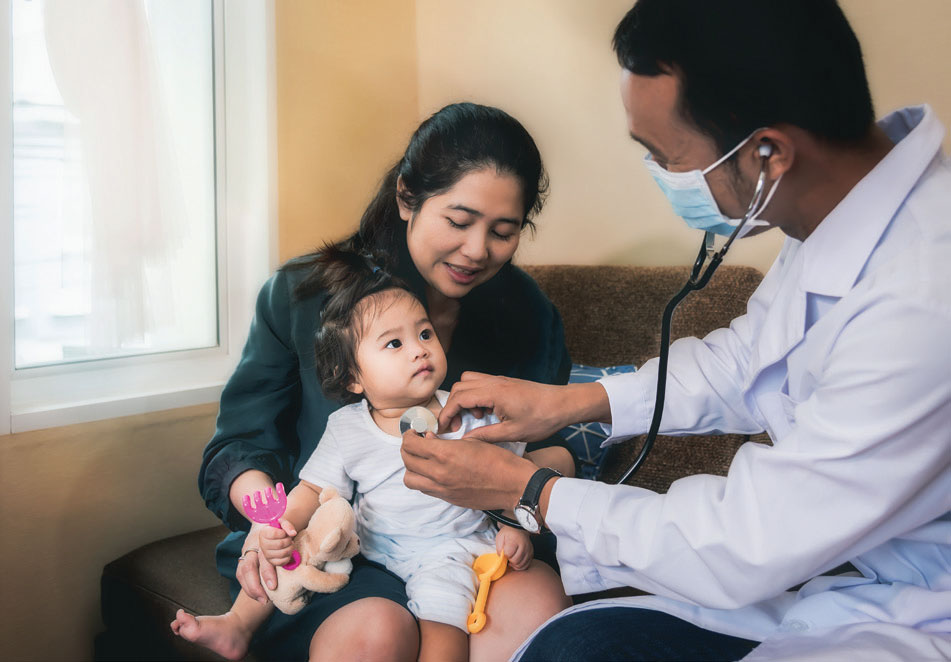
Co-Pay Savings Program
We provide financial assistance to eligible commercially insured patients in the U.S. through co-pay card programs, significantly reducing their monthly out-ofpocket expenses. This program currently supports three of our medications: Doxycycline capsules, Tiotropium Bromide Inhalation Powder capsules, and Lapatinib tablets. For patients with insurance, out-of-pocket costs can be as low as USD 0, while those without coverage may benefit from savings up to the program’s maximum limit. In FY25, we reimbursed over USD 524,000 across these three products, alleviating the financial burden for patients who depend on these treatments.

Health Economic Evaluation
While symptom relief is a clear measure of a medicine’s value, reducing healthcare costs is equally important and we at Lupin recognize this responsibility as an industry leader.
We assess the impact of our products on healthcare costs through formal health economic evaluations. NaMuscla®, one of our flagship innovations with orphan drug designation, has been launched in select geographies. In FY25, it generated sales of INR 1,310 Mn, representing 0.6% of our total sales and 100% of our innovative product revenue. An advantage for us is that health economic evaluations conducted in the U.K., Norway, and other markets have consistently demonstrated NaMuscla’s clinical value and cost-effectiveness for patients with non-dystrophic myotonic disorders. Leading Health Technology Assessment (HTA) bodies including National Institute for Health and Care Excellence (NICE, U.K.), IQWiG (Germany), PBAC (Australia), NoMA (Norway), and MSCBC (Spain) have also acknowledged its therapeutic benefits, facilitating its inclusion in public healthcare systems and improving patient access to this vital treatment. The NICE price approval process primarily evaluates the cost-effectiveness of new treatments or technologies for the NHS (National Health Service), using the incremental costeffectiveness ratio (ICER), which compares a new treatment’s additional cost against its additional health benefits. Through such rigorous health economic evaluations, Lupin ensures that treatments like NaMuscla® deliver cost-effective care, enhancing patient access and health outcomes globally.
Donations
Donations too can close access gaps, providing patients with life-changing treatments and promoting healthier communities. Through our Brazilian subsidiary, Medquímica, we have improved access to Cuprimine®. It is a critical medicine for the treatment of Wilson’s Disease, a rare genetic disorder that can cause severe liver and neurological damage if untreated. We have made multiple donations to Instituto Vidas, a Brazilian organization dedicated to supporting patients with rare diseases. We have facilitated timely access to this critical treatment, thereby enhancing survival rates and mitigating long-term complications for affected individuals. As the exclusive producer of this medicine in Brazil, we recognize our responsibility to ensure its availability for those requiring it. When there were floods in May 2024 in Rio Grande do Sul, we provided essential medicines to assist the affected community during this challenging period. All donations we make fully comply with our Company Donation Policy, which adheres to the principles and practices of the WHO Guidelines for drug donations.
Responsible Supply Chain
Lupin is committed to building a resilient, ethical, and highperforming supply chain that not only ensures operational excellence but also drives strategic sustainability. We actively foster diversity across our supplier network, spanning various geographies and categories, to mitigate disruptions and to ensure seamless delivery of life-saving and essential medicines. We also evaluate alternative sources for vital raw materials to bolster supply reliability and risk management. Every supplier we work with is expected to adhere to our Supplier Code of Conduct, which mandates compliance with Lupin’s standards on product quality, ethics, environmental sustainability, and human rights. Regular audits ensure that the quality of raw materials consistently meets our specifications and complies with statutory standards.
Our commitment to responsible sourcing is further reflected in our robust ESG assessment program, conducted through independent third-party evaluations and facilitated by our dedicated supplier portal, which streamlines onboarding and collaboration.
As part of our Scope 3 decarbonization strategy, we have mapped a priority group of 300+ suppliers contributing significantly to emissions from purchased goods and services. We are actively engaging these suppliers in targeted initiatives for emission reduction. Our holistic approach to sustainability is exemplified through practical innovations such as transitioning from air to sea freight—reducing air pallet usage from 34% to 14%, developing green propellants, replacing paper inserts with QR codes (saving 72,000+ kg of paper), and optimizing IT resources through asset lifecycle extension and cloud adoption. These efforts collectively reinforce our vision of a future-ready, responsible supply chain that delivers excellence with integrity.
ESG Assessment of Suppliers/Vendors
Our commitment to sustainability extends beyond the boundaries of our operations. In FY25, we institutionalized a robust Supplier ESG Evaluation Program — integrating environmental, social, and governance parameters into both supplier onboarding and ongoing performance assessments.
Through this framework, we are able to actively track the ESG footprint of key suppliers, focusing specifically on material vendors. We exemplify leadership by organizing capacity-building webinars, facilitating ESG self-assessments, and conducting onsite audits that culminate in structured Corrective and Preventive Action Plans (CAPA). This is our approach to achieve responsible and sustainable supply chain growth. Our efforts extend beyond merely managing our supply chain; we are committed to ensuring its resilience and sustainability for the future.
| Our ESG-Focused Engagement with Suppliers: | |
|---|---|
| Supplier Training on ESG |
|
| Supplier Commitment to Lupin Code of Conduct |
|
| Supplier ESG Assessment |
|
| Supplier Corrective Action Plan/ Improvement Plan |
|
Through a responsible supply chain, we strive to actively support our vendors in identifying and mitigating ESG-related risks across every link of our supply network. We work closely with our partners to close gaps and strengthen standards by leveraging targeted capacity-building initiatives. When potential or actual ESGrelated risks are identified, we extend Corrective and Preventive Action (CAPA) support to facilitate improvement. Besides ensuring compliance, we equip our vendors with practical tools and educational resources, featuring case studies and best practices from benchmark suppliers. By collectively raising standards, we not only enhance our processes but also generate a positive change that fortifies the entire value chain.
Benefits (Lupin Users)
- Faster supplier onboarding and streamlined post purchase order (PO) collaboration
- Robust controls and improved compliance throughout post PO processes
- Enriched UX and complete visibility throughout post PO processes
- Reduced administrative tasks and faster issue resolution
- Enhanced supplier collaboration
Benefits (Vendors)
- Unified access to purchase orders, advance shipment notification, invoice submission, and payment visibility
- Self-management of master data/supplier profiles
- Improved collaboration with Lupin users
- Faster query resolution

Decarbonization of Value Chain
Transforming our supply chain into a clean, sustainable engine of progress is central to our climate journey. In the pharmaceutical sector, supply chains significantly affect overall environmental impact. At Lupin, Scope 3 emissions account to nearly 75% of the total carbon footprint. Out of our Scope 3 emissions, approximately 40% originate from Purchased Goods and Services.
Recognizing this, we have adopted a bold and necessary goal. In FY25, we officially defined our Scope 3 target: Achieving a 61% intensity based reduction in emissions by 2034, in accordance with Science Based Targets initiative (SBTi) guidelines.
By actively engaging and collaborating with our supplier ecosystem, we are enabling smarter sourcing decisions, greener operations, and long-term carbon reduction. Together, we are developing a value chain that is future-ready and committed to delivering excellence with responsibility.
We have mapped a priority group of 306 suppliers who collectively contribute to 51% of our total emissions from Purchased Goods and Services. This data-driven insight forms the backbone of our Scope 3 decarbonization roadmap. With this foundation in place, we are now moving forward with targeted engagement of these critical partners to activate our value chains decarbonization journey. In parallel, we are building a dedicated governance framework to oversee these efforts — ensuring alignment, accountability, and momentum as we pursue our long-term sustainability goals.
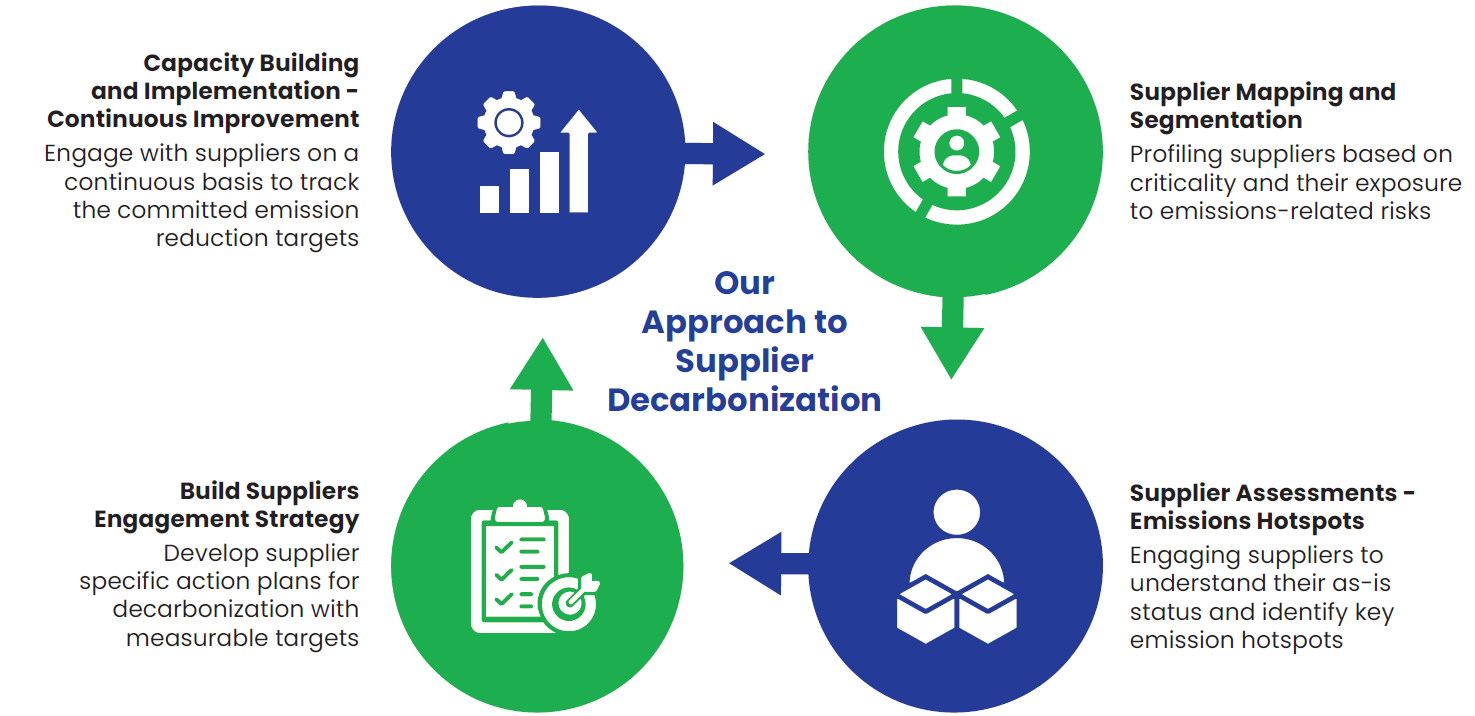
Strong relationships are foundational to sustainable healthcare. Through strategic partnerships and shared purpose, we are building an innovation-driven and patient-centric ecosystem where every stakeholder, across developed and emerging markets, thrives.
Dr. Fabrice Egros, President — Corporate Development
| Case Studies | |
|---|---|
| Air to Ocean Logistics |
Transitioning to Sea FreightLupin’s global supply chain has embarked on a targeted initiative to shift from air freight to sea freight, aimed at reducing logistics costs and minimizing carbon emissions. Sea freight offers a significantly lower carbon footprint per ton-kilometer compared to air transport, and this shift also enhances our customer service by reducing costs. To track our progress, we monitor the metric “Percentage of Air Pallets,” which measures the proportion of total shipments sent to the U.S. from Lupin’s manufacturing sites via air cargo. In FY25, this metric dropped to an all-time low of 14%, a substantial improvement from 34% in FY24. |
|
Packaging Material |
Lupin has substituted conventional paper inserts in medicine packaging with QR codes in select products, enhancing both environmental sustainability and user experience. Patients can access accurate, up-to-date information by simply scanning the QR code. This shift was conducted in compliance with health and safety regulations and approvals. It underscores Lupin’s commitment to sustainability by reducing paper usage and packaging waste, and illustrates how digital solutions enhance patient care. |
|
Employee Commute |
Lupin has implemented several measures to enhance employee travel, aiming to foster efficiency, flexibility, and improved data monitoring for future enhancements. The company has transitioned to the SOTC/Thomas Cook platform, integrated with Concur, streamlining travel booking. We also encourage employees to use ride-sharing apps for local commuting. These initiatives will enable us to effectively track, manage, and ultimately reduce travel emissions over the long term. |
|
Optimizing IT Resources |
Lupin adopts a comprehensive strategy to address IT-related emissions and reduce e-waste. Our key initiatives include:
|
We are very proud to have achieved the Ecovadis Silver Rating in FY25. This is a reflection of our progress in building a more responsible supply chain. By setting clear objectives and fostering robust collaboration within our partner ecosystem, we are making steady progress towards achieving our decarbonization goals.
Way Forward
Our access programs and local capacity-building initiatives serve as a robust foundation for our future.
Staying true to our purpose of catalyzing treatments that transform hope into healing, we are committed to expanding access to essential medicines, strengthening strategic partnerships, innovating across formulations, and enhancing patient-centric programs to address evolving healthcare needs.
On the sustainability front, our supplier program, rooted in measurable KPIs and a shared ethos of responsibility, underpins our efforts to build a more resilient and sustainable supply chain. We are dedicated to continually evaluating and improving these practices to expedite progress towards value chain decarbonization and responsible manufacturing. With a clear sense of purpose and direction, we move forward with intent, thereby shaping a healthier, more equitable, and sustainable future for all.
